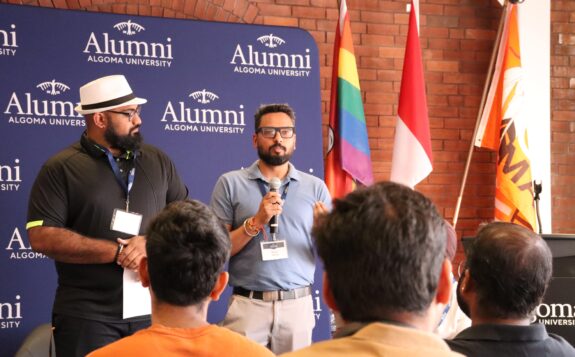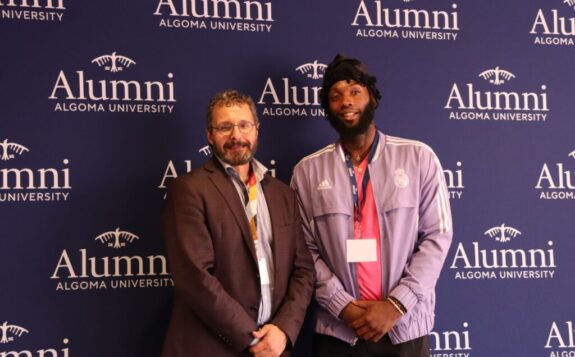Dr. Caicco’s (BA English / History ‘19) academic and professional journey has been one of dedication, advocacy, and a deep commitment to the reconciliation and decolonization of education systems in Canada. A proud graduate of Algoma University, she completed an honours double major in English and History in 2019, with particular recognition for her Excellence in History. Her decision to attend Algoma University was rooted in its profound history, as the campus is located on the former grounds of the Shingwauk Indian Residential School. This significant historical connection enriched her experience in ways few universities could, offering her the unique opportunity to walk the halls of a former Residential School while working with archival materials that brought her face to face with Canada’s colonial past.
Dr. Caicco’s time at Algoma shaped both her academic pursuits and her passion for Indigenous rights. Her undergraduate thesis, “Comparing Male Versus Female Residential School Attendees (Shingwauk Indian Residential School and Spanish Indian Residential School) 1940-1960”, was a deeply researched work examining the gendered experiences of Residential School survivors. Presenting her thesis in Shingwauk Hall, the very site she had been studying, was one of the most significant moments of her academic career. This experience fostered a desire to make a meaningful contribution toward understanding and addressing the historical injustices faced by Indigenous peoples in Canada. Her academic work became increasingly focused on Indigenous history and the intersections of Western and Indigenous educational practices.
Throughout her studies, Dr. Caicco developed a keen interest in how education systems can evolve to include Indigenous ways of knowing. She believes that by bridging Western forms of education with Indigenous perspectives, Canada can foster a more inclusive, cross-cultural education system that respects and incorporates Indigenous worldviews. This belief was central to her decision to pursue further education after Algoma.
Following her undergraduate degree, Dr. Caicco continued her academic journey by completing a Master of Education degree with a concentration in Indigenous Curriculum through Queen’s University. This program deepened her understanding of Indigenous research design, literature, and policy reform. Her master’s thesis, “Implementing Indigenous Curriculum Through Gamification Tools”, focused on bridging Indigenous culture and technology through the use of gamification in the classroom. By incorporating Indigenous stories and knowledge into interactive learning experiences, her work aimed to create more engaging and culturally relevant educational tools for students.
Dr. Caicco’s passion for educational reform did not stop there. She pursued a Doctorate of Educational Leadership at the University of Western Ontario, where she worked closely with Indigenous communities, scholars, and local leaders. Her dissertation, “Creating Pathways to Reconciliation Through Incorporating Indigenous Voices and Culture into the Development of Impact Benefit Agreements (IBAs) on First Nation Traditional Territory”, focused on the preservation of First Nation traditional lands through the development of IBAs. Her research advocated for the integration of Indigenous leadership into these agreements and emphasized the need for a cultural chapter in the drafting process—one that reflects Indigenous sovereignty practices, language reclamation, and decolonization methodologies. This work underscored the importance of giving voice to Indigenous communities, particularly in negotiations that directly affect their lands and futures.
Dr. Caicco’s advocacy for Indigenous rights extends beyond academia. In her current role as Education Manager for the Garden River First Nation Unit, she oversees multiple departments, including primary, secondary, and post-secondary education programs, as well as community-focused initiatives like the Adults in Motion Program. In collaboration with the supervisors of the various departments that make up the unit itself, she works with community leaders to develop strategies that promote educational success for Garden River’s members, aligning her work with the First Nation’s Strategic Plan. Dr. Caicco functions within legislative requirements while honoring the mission and values of the Garden River First Nation. Her role is one of leadership, mentorship, and collaboration, ensuring that Indigenous voices are not just heard but actively engaged in shaping educational pathways.
Dr. Caicco’s connection to Algoma University has remained strong. During her time at the university, she worked closely with the History and English departments, choosing courses that focused on Canadian history and Indigenous peoples. Two mentors in particular, Krista McCracken and Dr. Paulette Steeves, played pivotal roles in guiding her academic and professional development. As her thesis advisors, they provided support, experiential learning opportunities, and invaluable academic advice that helped shape her future career. The small class sizes at Algoma allowed Dr. Caicco to form lasting relationships with both faculty and fellow students, creating a sense of community that she continues to value.
Even after completing her studies, Dr. Caicco has stayed connected with Algoma University. She has worked with the Nordik Research Institute, assisting research associates on community-based projects, and collaborated with Dr. Jody Rebek on initiatives centered around community-driven research. Additionally, she has been part-time faculty for the Community Economic and Social Development (CESD) program at Algoma, providing instruction that draws from her own experiences and academic expertise. Her involvement with Algoma continues to be a source of pride, as she uses her knowledge and leadership skills to contribute to the university’s ongoing commitment to social justice and community engagement.
Dr. Caicco’s path to Indigenous advocacy began during her time at Fanshawe College, where she took an elective course in First Nations studies. It was in this classroom, where students sat in a circle and participated in cultural learning through smudging and roundtable discussions, that she first truly understood the injustices faced by Indigenous peoples. This experience inspired her to become an ally and advocate for Indigenous communities in her home and beyond. It also introduced her to the concept of land-based learning, a practice she continues to value in her work with Indigenous communities.
Dr. Caicco’s dedication to Indigenous rights and education is unwavering. She is a firm believer in the importance of bringing Indigenous issues to the forefront, and her work is an invitation for others to participate in the ongoing process of decolonization and reconciliation. Her doctoral dissertation focused on empowering Indigenous leaders and communities, advocating for their active involvement in the negotiation of Impact Benefit Agreements (IBAs) and promoting the preservation of Indigenous culture, language, and sovereignty.
In her own words, Dr. Caicco is committed to “leading with passion, writing with purpose, and embracing change as a force for good.” Her academic and professional work is driven by a desire to give voice to those who have been silenced for generations and to create pathways toward a more just and equitable future for Indigenous peoples. She draws inspiration from Indigenous leaders like Wab Kinew, Manitoba’s first Indigenous premier since John Norquay in 1887, whose words remind us all that we have the power to choose how we behave and whether we reflect the good around us.
Dr. Caicco is proud to be an Algoma University alum and a lifelong learner. Her journey from Algoma to Queen’s University, the University of Western Ontario, and beyond has been marked by a commitment to education, advocacy, and meaningful change. Her work continues to make a significant impact in the lives of Indigenous peoples, both through her research and her leadership within the Garden River First Nation and broader Indigenous communities.
Share Article



